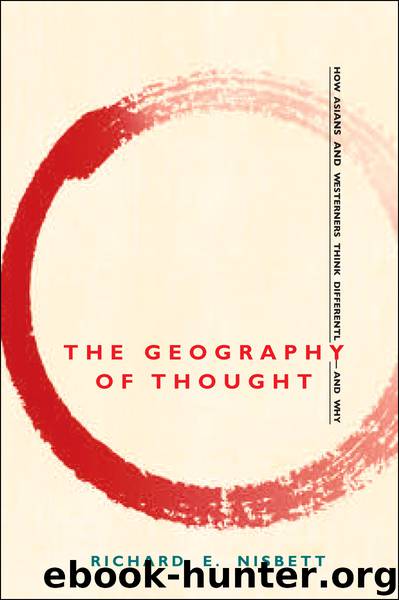The Geography of Thought: How Asians and Westerners Think Differently...And by Richard Nisbett

Author:Richard Nisbett [Nisbett, Richard]
Language: eng
Format: epub
Tags: Psychology, Cognitive Psychology, Philosophy & Social Aspects, Science, Cognitive Psychology & Cognition, Social Psychology
ISBN: 9781439106679
Google: 0v8e5I_TIPgC
Publisher: Simon and Schuster
Published: 2010-10-26T20:51:38+00:00
Easterners are almost surely closer to the truth than Westerners in their belief that the world is a highly complicated place and Westerners are undoubtedly often far too simple-minded in their explicit models of the world. Easterners’ failure to be surprised as often as they should may be a small price to pay for their greater attunement to a range of possible causal factors.
On the other hand, it seems fairly clear that simple models are the most useful ones—at least in science—because they’re easier to disprove and consequently to improve upon. Most of Aristotle’s physical propositions have turned out to be demonstrably false. But Aristotle had testable propositions about the world while the Chinese did not: It was Westerners who established what the correct physical principles are. The Chinese may have understood the principle of action at a distance, but they had no means of proving it. When it was proved true, it was by Western scientists who did not initially believe in it and who were actually trying to establish that all motion was of the billiard ball type, with objects moving only because they come into contact with some other object.
Westerners’ success in science and their tendency to make certain mistakes in causal analysis derive from the same source. Freedom to pursue individual goals prompts people to model the situation so as to achieve those goals, which in turn encourages modeling events by working backward from effects to possible causes. When there is systematic testing of the model, as in science, the model can be corrected. But Westerners’ models tend to be limited too sharply to the goal object and its properties, slighting the possible role of context. When it is everyday life—all too often a buzzing confusion—that is being modeled, recognition of error is more difficult. A mistaken model will be difficult to correct. So despite their history of scientific-mindedness, Westerners are particularly susceptible to the Fundamental Attribution Error and to overestimating the predictability of human behavior.
As we shall see next, Westerners’ preferred simplicity and Easterners’ assumed complexity encompass more than their approaches to causality. Their preferences extend to the ways that knowledge is organized more generally.
Download
This site does not store any files on its server. We only index and link to content provided by other sites. Please contact the content providers to delete copyright contents if any and email us, we'll remove relevant links or contents immediately.
The Art of Thinking Clearly by Rolf Dobelli(10412)
Mindhunter: Inside the FBI's Elite Serial Crime Unit by John E. Douglas & Mark Olshaker(9313)
Change Your Questions, Change Your Life by Marilee Adams(7733)
Nudge - Improving Decisions about Health, Wealth, and Happiness by Thaler Sunstein(7689)
Mastermind: How to Think Like Sherlock Holmes by Maria Konnikova(7313)
The Power of Now: A Guide to Spiritual Enlightenment by Eckhart Tolle(5744)
Men In Love by Nancy Friday(5230)
Altered Sensations by David Pantalony(5091)
Factfulness: Ten Reasons We're Wrong About the World – and Why Things Are Better Than You Think by Hans Rosling(4729)
The Confidence Code by Katty Kay(4247)
Thinking in Bets by Annie Duke(4216)
Man and His Symbols by Carl Gustav Jung(4120)
The Worm at the Core by Sheldon Solomon(3483)
Why Buddhism is True by Robert Wright(3446)
Liar's Poker by Michael Lewis(3440)
Three Women by Lisa Taddeo(3419)
The Inner Life of Animals by Peter Wohlleben(3302)
Descartes' Error by Antonio Damasio(3270)
How Music Works by David Byrne(3256)
